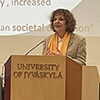Memetics and Popular Culture:
Using Memetics and Semiotics to Analyze Inherent Rhetoric of Culture
Monday 23 November 18:00-19:45
Engineering Building (EB) Room 2 (number 31 on the campus map)
This is the second of a series of sessions that the Philosophy Postgraduate Reading Group (PPRG) in conjunction with the Department of Philosophy will organise throughout this academic year 2015/16.
The session will be led by Daniel Abela, who has just completed an MA in Contemporary Western Philosophy at the University of Malta. The talk will draw on his dissertation, titled Memetics and Popular Culture: Using Memetics and Semiotics to Analyze Inherent Rhetoric of Culture, an abstract of which can be found below.
This reading group is intended for current and recent postgraduates, doctoral students and academics researching within or bordering the field of philosophy. Undergraduates are encouraged to attend these sessions. The aim is to have a speaker lead a session, presenting one’s research or work in progress. The speaker is to propose a text (10-20 pages) written by oneself and/or by a thinker one is familiar with or has written a dissertation about, and to suggest a brief commentary from the secondary literature on that text or thinker. Prior to the meeting, attendees are encouraged to read the sources provided.
Abstract
In this dissertation, I argue that memes and signs serve as the ideal means through which one can analyze the inherent rhetoric of culture. To do this I initially argue that the high-low culture dichotomy is ill-founded and all of culture is in a sense 'popular'. I proceed to show that for one to understand the dynamics of culture and its units, one must show how it unravels on a perpetual landscape. It is to this end that I employ memetics as a means of exploring culture. I then consider how memes and signs relate with each other. Whilst some semioticians sought to dampen and even extinguish the impact of memetics on semiotics I argue that they share a mutual relationship which benefits both parties. In the last part of the dissertation, I show that through the works of visual rhetoricians and the members of the Rhetoric Culture tradition one can conclude that all of culture is rhetorical. Therefore throughout the dissertation I argue that since the units of culture are memes and since contemporary rhetoric has broadened the scope of rhetoric to apply to all of the units of culture, then it must be the case that the memes are essentially rhetorical units.
Suggested readings in preparation for this talk are an excerpt from the dissertation, and chapter 11 (pg 189-201) from Richard Dawkins’ The Selfish Gene, which can be accessed here.


